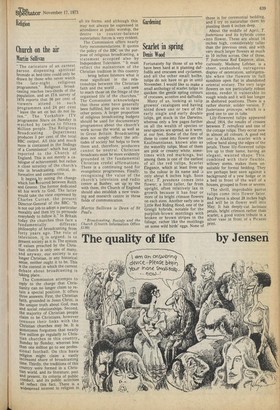Church on the air
Martin Sullivan
"The caricature of an earnest Parson dispensing spiritual bromide at bed-time could only be drawn by those who never watch the late-night religious programmes." Religious broadcasting reaches two-thirds of the Population, and an ITA survey of 1970 reports that 56 per cent of viewers attend to such Programmes and 24 per cent " leave the set on but do not lis ;ten,'% The Yorkshire ITV
'programme Stars on Sunday is 'watched by twelve to fifteen million people. The Religious
Broadcasting Department produces 3 per cent of the total BBC output. All this and much more is contained in the findings of a Commission" which has just reported to the Church of England. This is not merely a catalogue of achievement, but rather a close scrutiny of the church's role in broadcasting, critical, informative and constructive.
It begin by noting the change Which has &cuffed between Reith and Greene. The former dedicated all his work to God. The latter would take the view expressed by Charles Curran. the present Director-General of the BBC: "It IS not our job to adopt a particular morality and then try to persuade everybody to follow it." In Britain today the churches thus face a fundamentally different Philosophy of broadcasting from forty years ago. The role of television, i is argued, is to Present society as it is. The system Of values preached by the Chris tian church is only one of many, and anyway, our society is no longer Christian, in any historical sense, neither ought it to be. This IS the context in which the current debate about broadcasting is taking place. The Commission attempts to reply to the charge that Chris tianity can no longer claim to re tain a special position. It offers three answers. First, the Christian faith, grounded in Jesus Christ, is the unique truth about God, man and social relationships. Second, the majority of Christian people Claim to be Christians, however tenuous their links with the Christian churches may be. It is sometimes forgotten that nearly five million go regularly to Christian churches in this country,. Sunday by Sunday, whereas less than one million go to see profes sional football. On this basis religion might claim a vastly increased share ot broadcasting time. Thirdly, the traditions of this country were formed in a Christian world, and its literature, past and present, its criteria of public conduct, and its public activities all reflect this fact. There is a Widespread interest in religion in all its forms, and although this may not always be expressed in attendance at public worship, the desire to counter-balance materialistic forces is very evident.
The Commission offers nearly forty recommendations. It quotes the policy of the BBC on the purpose of religious broadcasting, a statement accepted also by Independent Television. " It must reflect the mainstream of the Christian tradition in this country . . . bring before listeners what is most significant in the relationships between the Christian faith and the world . . . and seek to reach those on the fringe of the organised life of the churches." The Commission acknowledges that these aims have generally been fulfilled, but goes on to raise other points. A larger proportion of religious broadcasting budgets should be used for documentary programmes about the church's work across the world, as well as in Great Britain. Broadcasting does not simply reflect the attitudes of society but helps to form them and, therefore, producers cannot be neutral. Christian broadcasts must be more evidently grounded in the fundamental Christian credal affirmations. There is a continuing need for evangelistic programmes. Finally, recognising the value of the church's television and radio centre at Bushey, set up xy the with them, the Church of England should also establish a new training and research centre in these fields of communication.
Martin Sullivan is Dean of St Paul's.
* Broadcasting, Society and the Church (Church Information Office ,C1.00)


































 Previous page
Previous page